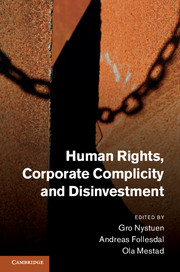Book contents
- Frontmatter
- Contents
- Note on the contributors
- Referenced case law
- Acknowledgements
- 1 Introduction
- 2 Disinvestment on the basis of corporate contribution to human rights violations: the case of the Norwegian Government Pension Fund
- 3 Laws, standards or voluntary guidelines?
- 4 Responsibility beyond the law?
- 5 Attribution of responsibility to listed companies
- 6 Responsibility for human rights violations, acts or omissions, within the ‘sphere of influence’ of companies
- 7 Human rights investment filters: a defence
- 8 The moral responsibilities of shareholders: a conceptual map
- 9 Sovereign wealth funds and (un)ethical investment: using ‘due diligence’ to avoid contributing to human rights violations committed by companies in the investment portfolio
- 10 Corporations and criminal complicity
- Appendices
- Bibliography
- Index
2 - Disinvestment on the basis of corporate contribution to human rights violations: the case of the Norwegian Government Pension Fund
Published online by Cambridge University Press: 07 October 2011
- Frontmatter
- Contents
- Note on the contributors
- Referenced case law
- Acknowledgements
- 1 Introduction
- 2 Disinvestment on the basis of corporate contribution to human rights violations: the case of the Norwegian Government Pension Fund
- 3 Laws, standards or voluntary guidelines?
- 4 Responsibility beyond the law?
- 5 Attribution of responsibility to listed companies
- 6 Responsibility for human rights violations, acts or omissions, within the ‘sphere of influence’ of companies
- 7 Human rights investment filters: a defence
- 8 The moral responsibilities of shareholders: a conceptual map
- 9 Sovereign wealth funds and (un)ethical investment: using ‘due diligence’ to avoid contributing to human rights violations committed by companies in the investment portfolio
- 10 Corporations and criminal complicity
- Appendices
- Bibliography
- Index
Summary
Introduction
To what extent can companies be morally, or even legally, responsible for human rights abuses that take place in connection with their conduct of business? Moreover, to what extent can investors be responsible for unethical conduct by companies within their portfolio?
Such questions have been discussed for many years and in many different settings; within religious groups, in financial institutions and, not least, in civil society. There has been extensive debate over the past years in many international fora, including the UN, about the concept of corporate responsibility for human rights abuses. The launching of the UN Global Compact in 1999, as well as the ‘Draft Norms on the Responsibilities of Transnational Corporations and Other Business Enterprises with Regard to Human Rights’ (the Draft Norms), which were discussed but not adopted by the UN Commission on Human Rights in 2004, reflect such debates. The Secretary-General’s Special Representative on business and human rights, John Ruggie, has contributed to these discussions, as have a number of other intergovernmental organizations, non-governmental organizations, academics, companies and governments.
- Type
- Chapter
- Information
- Human Rights, Corporate Complicity and Disinvestment , pp. 16 - 43Publisher: Cambridge University PressPrint publication year: 2011
- 4
- Cited by



